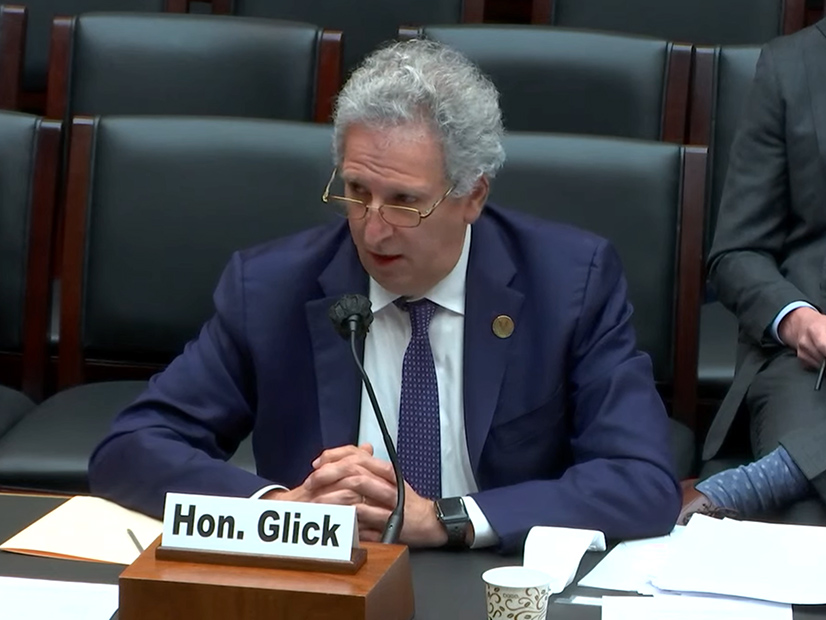
Warning of danger to both the nation’s natural gas infrastructure and the bulk power system if the current status quo continues, FERC Chairman Richard Glick on Wednesday lent his support to a proposal by House Democrats that would expand the commission’s powers to regulate natural gas pipelines.
In a three-hour-plus hearing, Glick fielded questions from the House Energy and Commerce Subcommittee on Energy on HR 6084, the Energy Product Reliability Act. Sponsored by subcommittee Chair Bobby Rush (D-Ill.), the bill would create an energy product reliability organization (EPRO) to — in the words of a memorandum circulated ahead of the hearing — “oversee the reliable delivery of energy products on energy pipelines through mandatory and enforceable reliability standards.”
The bill is modeled on Section 215 of the Federal Power Act, which authorized FERC to certify an electric reliability organization, and the proposed EPRO would have a similar relationship to the commission as NERC and the regional entities. It would be required to devise mandatory reliability standards to ensure reliable operation of natural gas pipelines and submit them to FERC for approval, while having many of the same powers as the ERO for enforcement and assessment and review of penalties by FERC.
In his written testimony, Glick lauded the “great strides” that the ERO Enterprise has made toward “improving reliability of the” grid, but he warned that without a similar framework in the natural gas sector, the U.S. remains vulnerable to disruption of the energy supply. He frequently cited last year’s winter storms, which led to thousands of outages across Texas as gas distribution systems failed amid extreme cold weather, to illustrate how the current regulatory regime fails to account for electric-gas interdependencies. (See FERC, NERC Share Findings on February Winter Storm.)
HR 6084 would explicitly require the EPRO to create standards that ensure the reliable supply of natural gas for electricity generation to avert such shortfalls. In response to a question from Rep. Kim Schrier (D-Wash.), Glick said that a more reliable natural gas supply would give electric generators confidence “that they will be able to access the fuel they need to keep the electric generation going during times of extreme weather.”
Cybersecurity Remains a Major Concern
Glick also frequently invoked cybersecurity as a major risk to both the gas pipeline system and the grid, reminding lawmakers of the Colonial Pipeline cyberattack in May that caused the company to shut down its entire pipeline network, a major source of petroleum products to the U.S. East Coast, for several days. (See Colonial Hack Sparks Competing Recommendations at FERC.) The FERC chairman reminded the subcommittee that even before the attack, he and former Commissioner Neil Chatterjee had called for FERC to assume jurisdiction over pipeline security, which is currently handled by the Transportation Security Administration.
Asked by Rep. Mike Doyle (D-Penn.) how HR 6084 would improve the situation, Glick pointed to two key differences. First, the EPRO would have jurisdiction over all aspects of reliability, not just physical and cybersecurity. Second, unlike TSA security regulations that must be renewed every year, EPRO standards would have no time limit.
“The EPRO would be able to propose, and FERC [to] approve … permanent standards that could be modified over time,” Glick said. “I think it’s very important to have a standard-setting situation where you don’t have to come back every year and renew those standards, [but] you’d have some sort of certainty for pipeline companies and others to make the investments they need to make to comply with longer-lasting standards.”
GOP Skeptical About Expanding FERC’s Mandate
Republicans on the subcommittee devoted most of their time to criticizing the Biden administration’s energy policies, repeatedly questioning Glick’s fellow witness, Deputy Energy Secretary David Turk, about the impact of decisions such as revoking the permit for the Keystone XL crude oil pipeline on Biden’s first day in office, or releasing 50 million barrels of oil from the Strategic Petroleum Reserve in November.
But the proposed EPRO did not escape their attention. They sought to portray HR 6084 as an unnecessary expansion of FERC’s power and a distraction from high energy prices. Speaking for many in the minority, Ranking Member Fred Upton (R-Mich.) called the proposed legislation “completely off-base, out of touch with the realities facing America today … [and] a sweeping power grab pre-empting states and local jurisdictions from regulating all types of energy infrastructure.”
“This bill would dramatically expand FERC, transforming a relatively tiny agency into a behemoth with regulatory powers over America’s energy system,” Upton said. “We’re not just talking about interstate pipelines and the bulk power system, [which] cross state lines; this bill would impose new federal taxes, fees and regulations on all energy in the country. Americans are not asking for that bill.”
Rep. Greg Pence (R-Ind.) questioned Glick about the potential cost of mandating new standards and whether the prospect of complying with a new regulatory regime would discourage construction of new pipelines. In response, Glick argued that the long-term benefits of stabilizing the essential gas infrastructure would more than outweigh the upfront costs of compliance.
“I think if you talked to many of the electricity companies, they would argue the fact that we now have mandatory reliability standards on the electricity side [has] actually reduced their cost,” Glick said. “Because they become more reliable, they don’t have to buy backup power. … They don’t have to … go out and build a facility over and over again every time a hurricane comes and lands on their shores. So, I think that actually, in the long term, we’re talking about a more reliable system [and] making sure that the actual costs to consumers go down.”



